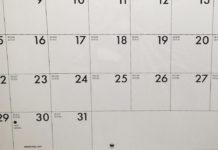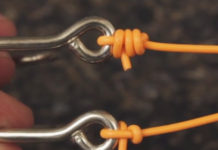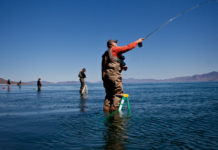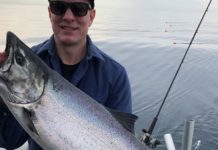Happy Nevada Day and Halloween everyone! Last week’s precipitation is great news for area anglers. Streams have been running well below normal all summer due to the drought we are currently in and while stream flows surged from the rain and snow, getting the ground saturated before the winter freeze is much more important.
Last winter’s snowpack, while not great, wasn’t as bad as some years. So why didn’t the streams show better flows? The summer and fall of 2020 were very dry. So dry that the ground had no moisture in it going into winter.
When the snow started to melt in the spring the ground was so parched that it sucked up the moisture from the snow melt and didn’t allow it to runoff into the streams. If it can’t make it to the streams, it can’t make it to the reservoirs.
Ranchers in the area have shared that when trying to irrigate their fields this summer, the irrigation ditches were sucking the water into the ground so fast that it often took hours for the water to get just a few hundred feet down the ditch towards the fields they wanted to irrigate, losing as much as 50%, or more, of the moisture to the ground in the ditches.
The saturating rain and snow of the last two weeks in October have the ground soaked before it freezes for the winter. Once the ground freezes for the winter it will lock in this moisture in so that next spring the runoff should make it to the streams and reservoirs. Now we just need a decent snowpack.
People are also reading…
WILDHORSE
Surface water temperatures have dropped into the mid 40’s and the water is clear of algae. Trout fishing has been good while bass fishing has slowed for numbers but is doing okay for size. Expect bass fishing to drop off even more as water temperatures drop. Shore anglers are now doing as well as boaters for trout. While both Hendricks and Penrod arms have been producing trout fish are being caught at most of the popular spots around the lake. There really isn’t a bad place to fish. Chironomids, leech patterns and wooly buggers are still the best bet for fly anglers but the usual nymph assortment of copper Johns, hares ears, and pheasant tails have all been working. Bait anglers should be using worms or PowerBait fished off the bottom in shallower water or suspended several feet below a bobber. Small spinners should also be effective. Boaters have had success with flashers tipped with worms. Bass anglers have had success with crayfish pattern crankbaits and blade baits as well as deep diving minnow imitations. Orange or gold has also been a good color for perch, bass and trout. Expect to catch several perch between bass and trout hookups. Anglers may keep one black bass 15 inches or longer. The lake is at 50% capacity and both prop rock in the canyon and the island off the state park are just barely above water. Both are still boating hazards. Wildhorse was stocked with approximately 2,000 rainbow trout last week with more expected this week.
SOUTH FORK RESERVOIR
The surface water temperature mid-week was 47 degrees and the weeds and algae are mostly gone. Bass fishing has been slow to fair for numbers but good for size. Trout fishing from shore this week has been very good, especially on the west side along Jet Ski Beach. Fly fishermen report that they have been catching nice fish with many different fly patterns including wooly buggers, leech patterns, red copper Johns, hares ears and chironomids (midge larva) patterns. Ice cream cones, red butt buzzers, red and silver zebra midges, red brassies and frostbite chironomids are all working. Anglers are also having some success with spinners, worms and PowerBait fished from shore. Rainbow trout-colored spinners have been effective. Blade baits, crankbaits and soft plastics have caught a some nice bass though expect bass fishing to drop off as the water cools over the next 10 days. When fishing for bass this time of year, get deeper and fish more slowly. South Fork was stocked with more than 20,000 trout last week.
WILSON RESERVOIR
Very little change here. With surface water temperatures dropping into the high 40s, fishing for trout has been fair to good while bass fishing is just fair. Time to switch to blade baits and crankbaits for bass. For the bait anglers, worms seem to be working better than PowerBait for trout. Spin fishermen should be using blue or green spinners with silver blades. Fly rodders should have some success with leech and wooly bugger patterns. Nymphs include blue copper Johns, hares ears, PT’s and chironomids. The boat ramp is out of the water and is unusable. Cartopper craft only advised. With recent precipitation, roads may be muddy though should dry out quickly.
RUBY LAKE NWR
The cool fall days have made trout fishing productive in the collection ditch. Bass fishing is done in the south lake with the colder mornings having some skim ice at the main boat ramp. While dry flies may catch a few fish in the ditch, nymphs and streamers are the ticket right now. Right now leech patterns, balanced leeches, crystal buggers, #14-16 hare’s ears, and #16-18 PT nymphs and chironomids under an indicator are probably the best bet. Other flies working include the usual small nymphs, olive soft hackles, red or blue copper Johns, and prince nymphs. Some of the best fishing reported has been on the days that were cloudy and windy. On warmer afternoons if there appears to be a hatch, Griffith’s gnats and blue winged olives should be tried.
JAKES CREEK/BOIES RESERVOIR
Surface water temperatures have dropped into the mid to high 40s and the water level is low. Algae and vegetation mats should have been blown off with the recent storm front that moved through. However, due to the lower water level, the best fishing access is still from a cartopper or float tube. Expect slow fishing for bass and catfish. The usual worms and PowerBait, as well as small spinners, rooster tails, and panther Martins should work for trout. Fly rodders should be using black or olive wooly buggers or leech patterns, hares ears, PT nymphs and chironomid patterns.
No recent report but trout fishing should be good here as at other reservoirs. The same flies, lures and techniques that work at South Fork should work here.
CAVE LAKE:
For safety reasons and to expedite the rebuilding of the dam, the lake is being drained and anglers should avoid this lake. Water being drained will be diverted to Comins Lake and if conditions allow, NDOW will be performing a fish salvage moving the fish from Cave and taking them to Comins Lake. Shorelines will be very soft and dangerous due to the complete saturation of the soil as the lake is drained. By draining the lake it should shave a couple of years off the re-building of the dam and cut costs tremendously. It will also make the project much safer for those performing the work.
COMINS LAKE
The new boat ramp should be useable now thanks to the hard work of volunteers from the Ely area and the contractor. Surface water temperatures are in the mid 40s. Fishing has been slow for bass but good for 14 to 17-inch trout. Anglers will catch trout on nightcrawlers, spinners, nymphs and wooly buggers. Chironomid patterns under an indicator are effective here this time of year. Bass fishing is slow using crankbaits and spinnerbaits fished slowly for the best chance at a bass. Minnow imitations and large streamer patterns should work for northern pike. Anglers, please note that NDOW has placed radio tags in several Northern Pike. These pike will have an orange floy tag near their dorsal fin and a small antenna coming from their stomach. Please return these fish to the water for research purposes. If the pike doesn’t have the transmitter tag, please humanely dispatch the fish. Do not put it back in the lake. Anglers may catch an occasional Bluegill but NDOW is asking that those fish not be harvested since they are the founder population of what could be a fun pan fishery. Comins Lake was stocked with approximately 3,000 fish last week.
ILLIPAH
Surface water temperatures are in the mid 40s here as well and fishing has been good. Best flies right now are leech or wooly bugger patterns. Brown trout may still be targeted at the inlet end of the reservoir but that is ending any day. Fly rodders will also do well on bead head pheasant tails, wooly buggers, chironomids and parachute Adams. Spinners, PowerBait, and nightcrawlers will do well for the spincasting crowd.
ANGEL LAKE
The lake received a fair amount of snow last weekend, but NDOT plows were busy keeping the road open. During the storm, fishing was slow, but it should have picked back up with the nicer weather. Good flies for stripping include mini leeches, crystal buggers, slumpbusters and wooly buggers (size 10 or smaller). Nymphs such as PT’s, hares ears, zebra midges, soft hackles and chironomids fished under indicators should be productive. Small dark colored spinners with contrasting bright spots have caught trout as well. As usual, bait anglers seem to have the best luck here with worms.
ALPINE LAKES
With the recent snows, access to the alpine lakes is getting more difficult. With colder temperatures at the higher elevations the lakes are starting to freeze over and fishing is pretty much done for the year. There will be no more fishing reports on the backcountry lakes until next spring.
STREAMS
Stream flows picked up significantly with last weekend’s storm system, but the water was very turbid. Flows have dropped back down to about normal and have cleared up. Central Nevada didn’t receive as much precipitation as northeastern Nevada did so the streams in that area haven’t rebounded like those in Elko County. The brook and brown trout spawn is over but many are still active and brightly colored. As of October 29, the East Fork of the Owyhee was flowing at 19 cfs near Mountain City, the Bruneau River at 17.7 cfs, the Jarbidge at 12.1 cfs, Salmon Falls Creek at 48 cfs, Lamoille Creek at 7.5 cfs, the South Fork at 10 cfs, Cleve Creek at 4.7 cfs, Steptoe Creek at 2.4 cfs and Kingston Creek at 3.7 cfs.
Credit: Source link






























